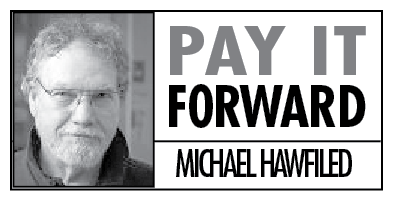I’m struck by the passages we go through in our lives. There are many passages we make by choice, from graduation and promotions, to enlistments, marriages and becoming parents. For me, however, the most important passages are the “natural passages,” those we go through, but not by choice. We go through them as we age and as we face the circumstances of life.
We go through these “natural passages” whether we like it or not, but one of the wonderful aspects of community, especially our community, is the help we get navigating these “natural passages.” Here lies the heart of community, and at the core of this stands the very meaning of philanthropy, whether through monetary donations or through volunteerism.
The Homer area is blessed with many examples that display the richness of philanthropy:
For example, in the Homer region the first passage, from infancy to youth, is the focus of Kachemak Kids. This non-profit organization offers programs for toddlers and preschoolers in all sorts of areas: art and music, science, reading and physical exercise.They also offer after-school programs for children in the lower elementary grades. As stated in their mission, the central challenge is to develop “a life-long love of learning, skills of collaboration, an understanding of the importance of kindness and respect, and an ability to think innovatively.”
As children grow into youths the role of mentoring becomes more critical. For children ages 6 through 18 Big Brothers/Big Sisters connects adult volunteers, or “Bigs,” with young people. Homer has a local chapter of this extraordinary national program that centers on creating positive relationships in the lives of young people. Donations support a small staff of professionals who recruit, vet and train adult volunteers for the “one-on-one relationships that change young lives for the better, forever.”
For adults, some inescapable passages arise that are less welcome. These may center on a host of “adult issues”: loss, disappointment, accident, poor or unhealthy choices, bad luck and more. Again, the Homer region turns to the philanthropic spirit of community for help with these passages.
The Homer Community Food Pantry, or “The Food Bank,” is but one of the many volunteer efforts that helps people in need. Every week those who need food come to the Homer United Methodist Church. No questions are asked as volunteers distribute food boxes to the walk-ins. More boxes are delivered by other volunteers to seniors and mothers with young children who can’t get to the food pantry, and still other boxes are sent across Kachemak Bay and up the Sterling Highway. The entire community participates in this effort. The food comes in from individuals, businesses, various non-profits, and, in season, the popular donation table at the Homer Farmers Market.
For many, the last of life’s natural passages centers on Hospice of Homer. Since 1985 Hospice of Homer has been providing non-medical assistance to area residents facing life-threatening illness or the transition process of dying. I have a special place in my heart for the hospice movement, because Hospice was there for me when I lost my first wife to cancer many years ago and then again when I lost my daughter, also to cancer. Hospice also was a blessed help in the passing of both my parents.
For me, these final passages in my own family gave especial meaning to the Hospice philosophy of “Compassion in Action” which centers on the personal, neighbor-to-neighbor spirit of volunteers, many of whom have experienced first-hand the stress of caring for a terminally ill family member.
Hospice trains the volunteers and coordinates their connections to those in need. Among the services Hospice of Homer provides free of charge loans of medical equipment, (from hospital beds, wheel chairs, and IV poles, to lift-recliners, walkers, and much more), and a lending library of books and videos helpful to those confronting serious illness.
When requested, trained Hospice volunteers also visit shut-ins and help with light chores or errands. Especially helpful in end-of-life circumstances, Hospice volunteers provide respite for family caregivers, as well as emotional support. Sooner or later, we all have to deal with loss and Hospice offers bereavement services to those who wrestle with the grief that comes with death.
All these passages are a part of life, but we are not alone facing them. We are exceptionally fortunate to live in a community so strong in its spirit of philanthropy and volunteerism. We all benefit, as the motto of Hospice reminds us, from amazing “Compassion In Action.”
Michael Hawfield lives in Homer and is associate professor of history at the Kachemak Bay Campus of Kenai Peninsula College and the current treasurer of Hospice of Homer.



